- Home
- Clive Barker
Abarat: Absolute Midnight a-3 Page 3
Abarat: Absolute Midnight a-3 Read online
Page 3
“Jimothi . . . Jimothi!” Candy stepped in the Cat King’s line of sight. “Nobody’s been hurt. It’s all right. There’s just some people here with no respect for those who are a little different.”
Jimothi stared through Candy not hearing her, it seemed, or listening to anything she was saying. His claws curled into the table and raked the polished wood.
“Jimothi . . .”
“I have such high regard for the visitor. I admit that predisposes me to think well of her, but if I genuinely believed she would be—as Zuprek put it—‘the death of us’ there is no sentiment in the Abarat that would make me merciful.”
“Well then, Zuprek,” Nyritta said. “I think it falls to you to prove or not to prove.”
“Forget proof,” Neabas said. “This isn’t about proof. It’s about faith. We who have faith in the future of the Abarat must act to protect it. Sometimes we will be criticized for our decisions—”
“You’re talking about the camps,” Nyritta said.
“I don’t approve of the girl hearing us discussing the camps,” Zuprek said. “It’s none of her business.”
“What does it matter?” Helio said. “People already know.”
“It’s time we discussed this,” Jimothi said. “Commexo is building one on Ninnyhammer, but nobody asks questions. Nobody cares as long as the Kid keeps telling them everything’s perfect.”
“Don’t you support the camps, Jimothi?” Nyritta said.
“No, I do not.”
“Why not?” said Yobias. “Your family line is perfectly pure. Look at you. Purebred Abaratian.”
“So what?”
“You’d be perfectly safe. We all would.”
Candy sniffed something of significance here, but she kept her tone as casual as possible, despite the sickening feeling she had in the pit of her stomach. “Camps?”
“It’s nothing to do with you,” Nyritta snapped. “You shouldn’t even be hearing these things.”
“You make it sound like they’re something you’re ashamed of,” Candy said.
“You’re reading something into my words that’s not there.”
“Okay. So you’re not ashamed.”
“Absolutely not. I’m simply doing my duty.”
“I’m glad you’re proud,” Jimothi jumped in, “because one day we may need to answer for every decision we’ve done. This interrogation, the camps. Everything.” He was staring down at his paws. “If this goes bad they’ll need necks for nooses. And they’ll be ours. It should be ours. We all knew what we were doing when we started this.”
“Scared for your neck, are you, Jimothi?” said Zuprek.
“No,” Jimothi said. “I’m scared for my soul, Zuprek. I’m afraid I will lose it because I was too busy making camps for Pure-bloods.”
Zuprek uttered a grinding growl, and started to get up from the table, his hands closed into fists.
“No, Zuprek,” Nyritta Maku said, “this meeting is at a close.” She threw an aside at Candy. “Go, child. You’re dismissed!”
“I haven’t finished with her!” Zuprek yelled.
“This committee has!” Maku said. This time she pushed Candy toward the door. “Go!”
It was already open. Candy glanced back at Jimothi, grateful for all he had done. Then she headed away through the door while Zuprek’s cries echoed off the Chamber walls:
“She’ll be the death of us!”
Chapter 3
The Wisdom of the Mob
CANDY FOUND MALINGO WAITING for her among the crowd outside the Council Chambers. The look of relief that flooded his face when she emerged was almost worth the discomfort of the highly unpleasant interview. She did her best to hurriedly explain all that she’d just endured.
“But they’ve let you go?” he said when she was finished.
“Yeah,” Candy said. “You thought they were going to throw me in jail?”
“It crossed my mind. There’s no love for the Hereafter, that’s for sure. Just listening to people passing by . . .”
“And the worst is still to come,” Candy said.
“Another war?”
“That’s what the Council thinks.”
“Abarat against the Hereafter? Or Night against Day?”
Candy caught a few suspicious glances coming her way. “I think we should continue this conversation somewhere else,” she said. “I don’t want any more interrogations.”
“Where do you want to go?” Malingo said.
“Anywhere, as long as it’s away from here,” Candy said. “I don’t want to have any more questions thrown at me until I’ve got all the answers straight.”
“And how do you plan on doing that?”
Candy threw Malingo an uneasy glance.
“Say it,” he said. “Whatever it is you’ve got on your mind.”
“I’ve got a Princess on my mind, Malingo. And now I know she’s been there since the day I was born. It changes things. I thought I was Candy Quackenbush from Chickentown, Minnesota. And in a way I was. I lived an ordinary life on the outside. But on the inside, in here,” she said, putting her finger to her temple, “I was learning what she knew. That’s the only explanation that makes sense. Boa learned magic from Carrion. And then I took it from her and hid it.”
“But you’re saying that aloud right now.”
“That’s because she knows now. There’s no use to play hide-and-seek, not for either of us. She’s in me, and I know it. And I’ve got everything she knows about the Abarataraba. And she knows that.”
I would have done the same thing, I don’t doubt, Boa said. But I think it’s time we parted.
“I agree.”
“With what?” Malingo said.
“I was talking to Boa. She wants her freedom.”
“Can’t blame her,” Malingo said.
“I don’t,” Candy said. “I just don’t know where to start.”
Ask the geshrat to tell you about Laguna Munn.
“Do you know somebody called Laguna Munn?”
“Not personally, no,” Malingo said. “But there was a rhyme in one of Wolfswinkel’s books about the woman.”
“Do you remember it?”
Malingo thought for a moment or two. Then he recited it:
“Laguna Munn,
Had a son,
Perfect in every way.
A joy to see at work time,
And bliss to watch at play!
But oh, how did she come by him?
I cannot bear to say!”
“That’s it?”
“Yeah. Supposedly one of her sons was made from all the good in her, but he was a dull child. So dull she wanted nothing to do with him. So she went and made another son—”
“Let me guess. Out of all the evil in her?”
“Well, whoever wrote the rhyme cannot bear to say, but yes, I think that’s what we’re supposed to think.”
She’s a very powerful woman, Boa said. And she’s been known to use her powers to help people, if she’s in the mood. Candy reported this to Malingo. Then Boa added, Of course, she is crazy.
“Why is there always a catch?” Candy said out loud.
“What?” Malingo said.
“Boa says Laguna Munn’s crazy.”
“And what—you’re Candy, the sane lady? I don’t think so.”
“Good point.”
“Let the mad find wisdom in their madness for the sane, and let the sane be grateful.”
“Is that a famous saying?”
“Maybe if I say it often enough.”
The geshrat talks a lot of sense . . . for a geshrat.
“What did she say?” Malingo asked Candy.
“How did you know she said anything?”
“I’m starting to see it on your face.”
“She said you were very clever.”
Malingo didn’t look convinced. “Yeah, I bet she did,” he said.
Their route took them back to the harbor via a selection of much smaller streets than those by which
they had ascended to the Council Chamber. There was an air of unease in these narrow alleys and tiny yards. People were going about anxious, furtive business. It was, Candy thought, as though everyone was making plans for what to do if things didn’t turn out right. Through partly opened doors that gave access into shadowy interiors she even caught a glimpse of people packing up in preparation for a hurried departure. Malingo clearly interpreted what they saw the same way because he said to Candy:
“Did the Council talk about evacuating The Great Head?”
“No.”
“Then why are people getting ready to leave?”
“It makes no sense. If anywhere’s safe, it’s the Yebba Dim Day. Lordy Lou! This is one of the oldest structures in existence.”
“Apparently old age isn’t what it used to be.”
They walked on in silence then, down to the harbor. There were a dozen fishing boats or more trying to find docking places so that the cargo of detritus could be unloaded.
“Bits of Chickentown . . .” Candy said grimly.
“Don’t let it bother you. The people here have heard so many things about your people over the years. Now they’ve got something to actually hold in their hands.”
“It looks like trash, most of it.”
“Yeah.”
“What are they going to think of Chickentown?” Candy said sadly.
Malingo said nothing. He hung back to let Candy go on ahead to examine the stuff the fishermen had scooped from the waters of the Izabella. Did the people of the Abarat think any of this was of value? Two pink plastic flamingos, washed away from somebody’s garden, a lot of old magazines and bottles of pills, some bits of bashed-up furniture, a big sign with a stupid bug-eyed chicken painted on it, and another that announced the subject of the Sunday sermon at the Lutheran Church on Whittmer Street: The Many Doors of God’s Mansion.
Somebody among the crowd, a golden-eyed, green-bearded individual lubricated by several bottles of the Kid’s Best Ale, had decided to take this opportunity to pontificate on the subject of how dangerous humankind and its wicked technologies could be. He had plenty of supporters and friends among the crowd, who quickly provided him with a couple of fish crates to stand on, from which perch he let loose a venomous tirade. “If the tide carried their treasures here,” he said, “then it’s going to bring some of their owners too. We need to be ready. We all know what the people of the Hereafter will do if they come back. They’ll be after the Abarataraba again.”
He had only got that far when Candy heard somebody nearby murmur her name.
She looked around, and quickly found a friendly face, that of Izarith, who’d taken the trouble to look after Candy when she’d first ventured into the chaotic interior of The Great Head. She’d fed Candy, and given her a warm fire by which to dry herself, even given Candy her first Abaratian garments to wear. Izarith was a Skizmut; her people were born from the deep waters of what Izarith had called Mama Izabella. Now she came through the crowd toward Candy, wearing what looked like a homemade hat, sewn from different kinds of seaweed. She was cradling her baby Nazré with one arm and holding the little hand of her daughter Maiza with the other.
She was very emotional about seeing Candy again. Her eyes filled with silver-green tears.
“I’ve heard so much about you since you first came to my house. About all the things that you’ve done.” She glanced at Malingo. “And I’ve heard about you too,” she said. “You’re the one who worked for the wizard, right? On Ninnyhammer?”
Malingo made a little smile.
“This is Izarith, Malingo,” Candy said. “She was very kind to me when I first got here.”
“I did what anybody would have done,” Izarith said. “Do you have time to come back to the house and tell me whether all the things I’ve heard are true? You both look hungry.”
“Actually, I am a little,” Malingo said.
But in the short time since Izarith had called to Candy the mood of the crowd had changed, influenced by the anger toward humankind pouring from the man with the green beard.
“We should hunt them down, every last one of them humans, and hang them,” he said. “If we don’t it’s only a moment of time before they come looking to steal our magic again.”
“You know, I don’t think we have time to eat, Izarith, much as we’d liked to stay.”
“You’re worried about Kytomini aren’t you?”
“Is he the one saying he’d like me hanged?”
“He hates everybody. Right now it’s your people, Candy. It could be geshrats in five minutes.”
“There’s a lot of people agreeing with him,” Candy said.
“People like to have somebody to hate. Me, I’m too busy raising the little ones.”
“What about your husband?”
“Oh, Ruthus is working on his boat right now. Patching it up for selling. We’re getting out of the Yebba Dim Day as soon as we have the money. It’s getting too dangerous.”
“Is his boat seaworthy?” Malingo said.
“Ruthus says it is.”
“Then perhaps he’d take us to the Nonce, for a price.”
“The Nonce?” Izarith said. “Why are you going there?”
“We’re meeting friends,” Candy said. She reached in her pockets as she talked, and brought out all the paterzem she had. Malingo did the same. “Here’s all the money we’ve got,” she said to Izarith. “Would that pay for the journey?”
“I’m sure it’ll be more than enough,” Izarith replied. “Come on, I’ll take you to Ruthus. The boat’s nothing fancy, just so you know.”
“We don’t need anything fancy,” Candy said. “We just need to get away from here.”
Izarith lent Candy her wide-brimmed hat, to keep anyone in the increasingly agitated crowd from realizing that they had a member of humankind in their midst, then led Candy and Malingo down the quay, past vessels large and small to one of the smallest of the lot.
There was a man on board doing some final work on his vessel with brush and paint. Izarith called her husband away from his work, and quickly explained the situation. Meanwhile Candy watched Kytomini’s audience from the corner of her eye. She had a nasty feeling that she and Malingo had not passed through the crowd entirely unnoticed, a feeling that was lent weight when several of the crowd’s members turned to look in Candy’s direction, and after a moment, started to walk down the quay toward them.
“We’re in trouble, Izarith,” Candy said. “Or least I am. I think it would be better if you weren’t seen with me.”
“What, them?” Izarith said, staring back contemptuously at the approaching thugs. “I’m not afraid of them.”
“Candy’s right, love,” Ruthus said. “Take the children quickly and go around the back of the fish market. Hurry.”
“Thank you,” Candy said. “Next time it won’t be so rushed.”
“You tell my husband to come back to us as quickly as possible.”
“He will, don’t worry,” Candy replied.
The man with the green beard, who had first incited the anger with his speechifying, was now breaking through the approaching little mob of bullies to lead it.
“Are we going?” Ruthus yelled.
“Oh, Lordy Lou, are we ever,” Candy said.
“Then come on!”
Candy jumped into the boat. Its boards creaked.
“If ye’ve cracked her boards and you drown, don’t blame me.” Ruthus grinned.
“We won’t drown,” Malingo said following Candy. “This girl has work to do. Great work!”
Candy smiled. (It was true. What, or how, or when—she had no idea. But it was true.)
Ruthus was racing to the wheelhouse yelling to Malingo as he did so: “Cut the rope, geshrat. Be quick!”
The dock was reverberating as the mob, its numbers increasing, followed Green Beard’s lead.
“I see you, girl!” he yelled, “and I know what you are!”
“Rope’s severed, Ruthus!”
“Hold on, then! And pray!”
“Go!” Candy yelled to Ruthus.
“Your crimes against the Abarat must be punished—”
The last word was repeated by every hate-filled throat in the crowd. “Punished!” “Punished!” “Pun—”
The third time, the threat was drowned out by the raucous roar of Ruthus’s little boat, as its engine came to life.
A cloud of yellow exhaust fumes erupted from the stern of the boat, its density blotting all sight of the mob, just as its din had blotted all sound.
Ruthus’s work was not over. They had got away from the dock, but they were not yet out of the harbor. And there were more opportunistic fishermen bringing in cargos of garbage all the time. If Ruthus’s boat had been any larger, it would have been caught in the confusion. But it was a tiny thing, and nimble-like, especially with Ruthus at the wheel. By the time the smoke trail had cleared, the boat was out of the harbor and into the Straits of Dusk.
Chapter 4
The Kid
CANDY’S ESCAPE FROM THE mob in the Yebba Dim Day had not gone unnoticed. The greatest concentration of eyes spying her jeopardy were at Three O’Clock in the Morning. At the heart of that extraordinary city was a vast round mansion, and at the heart of the mansion, a circular viewing chamber, where the innumerable mechanical spies that were scattered around the Abarat—perfect imitations of flora and fauna so cunningly crafted as to be indistinguishable from the real thing, but for the fact that each carried a miniscule camera—reported what they saw. There were literally thousands of screens in the Circular Room covering the inner and outer walls, and Rojo Pixler would have been there, watching the world he had brought into being—its little tragedies, it little farces, its little spectacles of love and death on full display—but today he was not riding around the room on his levitation disc, surveying the archipelago. The team of island-watchers was currently led by his trusted colleague, Dr. Voorzangler, wearing his beloved spectacles which offered the illusion that his two eyes were one. It was he who was noting any significant comings and goings, one of which was that of Candy Quackenbush. Voorzangler ordered his second, third, and fourth in command to be sure that each reminded the other to remind Voorzangler to report the movements of the girl from the Hereafter to the great architect when he finally returned.

 The Great and Secret Show
The Great and Secret Show Coldheart Canyon: A Hollywood Ghost Story
Coldheart Canyon: A Hollywood Ghost Story Galilee
Galilee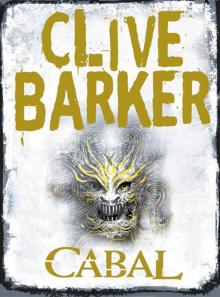 Cabal
Cabal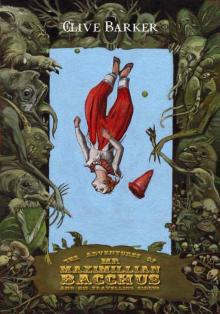 The Adventures of Mr. Maximillian Bacchus and His Travelling Circus
The Adventures of Mr. Maximillian Bacchus and His Travelling Circus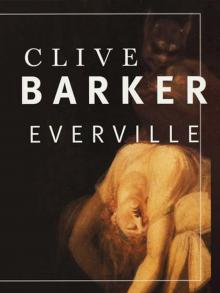 Everville
Everville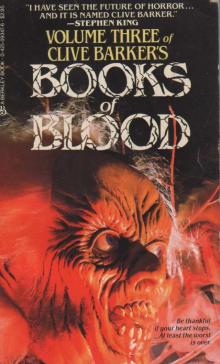 Books of Blood: Volume Three
Books of Blood: Volume Three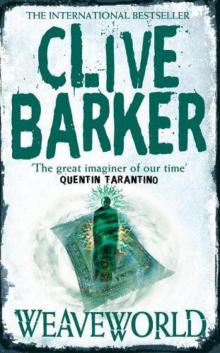 Weaveworld
Weaveworld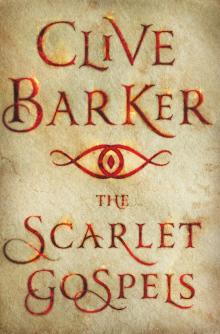 The Scarlet Gospels
The Scarlet Gospels Sacrament
Sacrament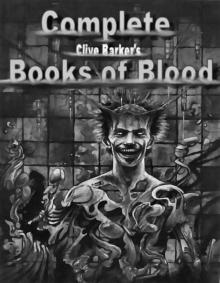 Books of Blood: Volumes 1-6
Books of Blood: Volumes 1-6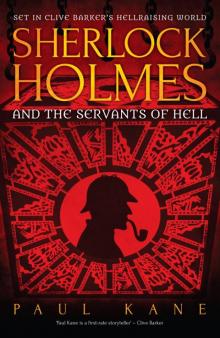 Sherlock Holmes and the Servants of Hell
Sherlock Holmes and the Servants of Hell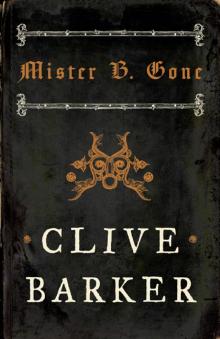 Mister B. Gone
Mister B. Gone Imajica
Imajica The Reconciliation
The Reconciliation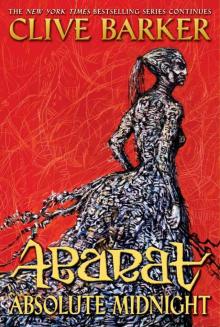 Abarat
Abarat Clive Barker's First Tales
Clive Barker's First Tales The Hellbound Heart
The Hellbound Heart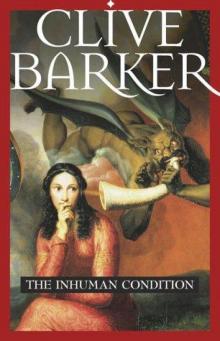 The Inhuman Condition
The Inhuman Condition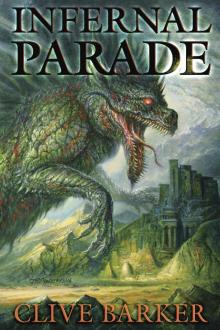 Infernal Parade
Infernal Parade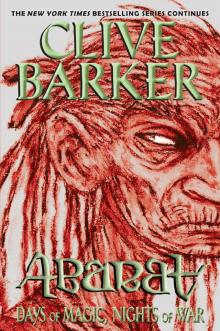 Days of Magic, Nights of War
Days of Magic, Nights of War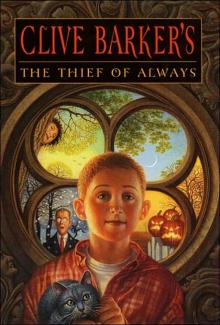 The Thief of Always
The Thief of Always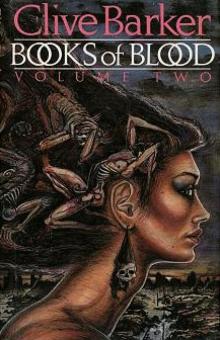 Books of Blood Vol 2
Books of Blood Vol 2 The Essential Clive Barker
The Essential Clive Barker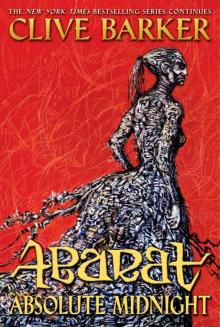 Abarat: Absolute Midnight a-3
Abarat: Absolute Midnight a-3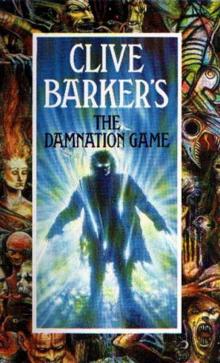 The Damnation Game
The Damnation Game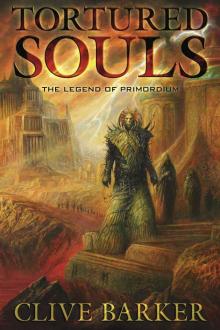 Tortured Souls: The Legend of Primordium
Tortured Souls: The Legend of Primordium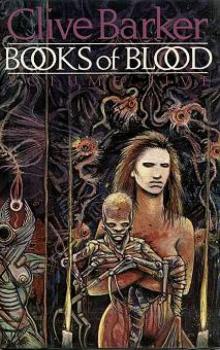 Books of Blood Vol 5
Books of Blood Vol 5 Imajica 02 - The Reconciliator
Imajica 02 - The Reconciliator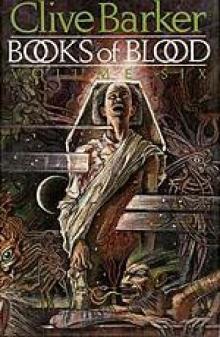 Books Of Blood Vol 6
Books Of Blood Vol 6 Imajica 01 - The Fifth Dominion
Imajica 01 - The Fifth Dominion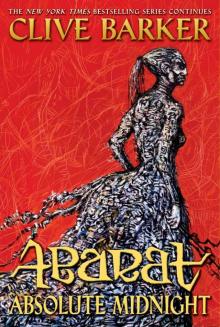 Abarat: Absolute Midnight
Abarat: Absolute Midnight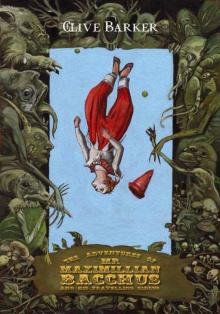 The Adventures of Mr. Maximillian Bacchus & His Traveling Circus
The Adventures of Mr. Maximillian Bacchus & His Traveling Circus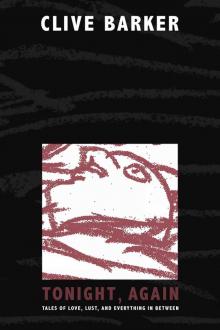 Tonight, Again
Tonight, Again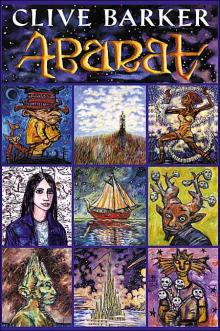 Abarat: The First Book of Hours a-1
Abarat: The First Book of Hours a-1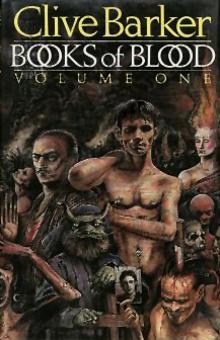 Books Of Blood Vol 1
Books Of Blood Vol 1 Age of Desire
Age of Desire Imajica: Annotated Edition
Imajica: Annotated Edition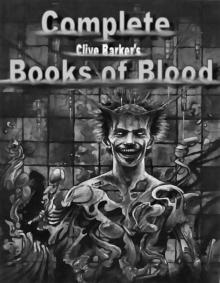 Complete Books of Blood
Complete Books of Blood Gutted: Beautiful Horror Stories
Gutted: Beautiful Horror Stories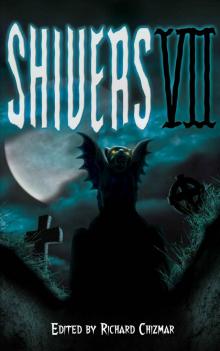 Shivers 7
Shivers 7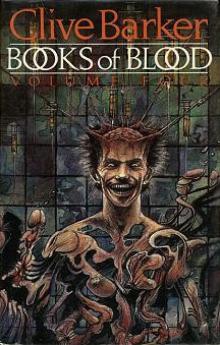 Books Of Blood Vol 4
Books Of Blood Vol 4